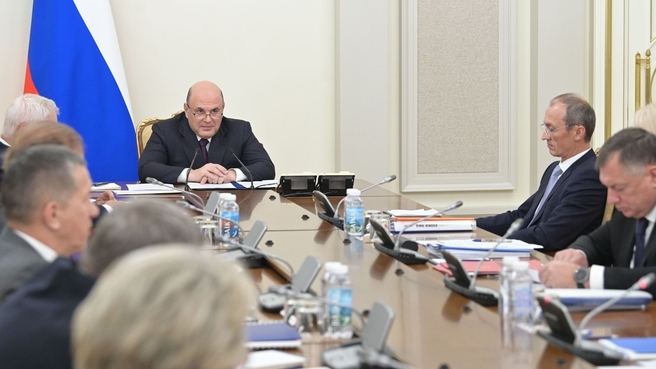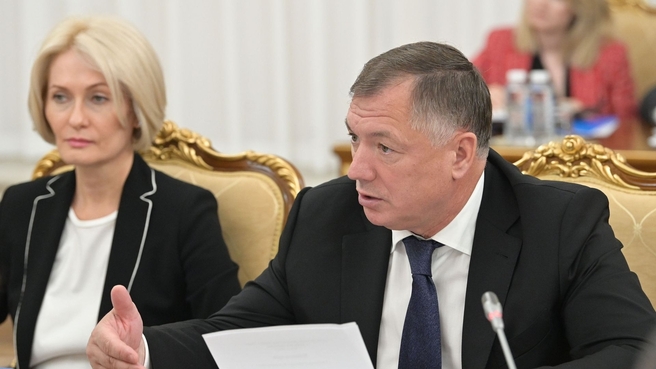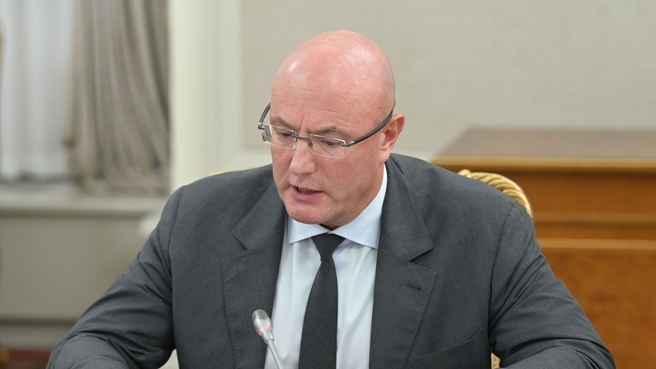Agenda: resumption of the programme of preferential loans for road construction, the progress of reconstruction and repair of access roads to educational institutions, and the results of the admission campaign to universities.
Mikhail Mishustin's opening remarks
Report by Dmitry Chernyshenko on the results of the admission campaign to universities
Excerpts from the transcript:
Mikhail Mishustin: Good afternoon, colleagues,
The President has repeatedly noted that new roads and convenient logistics open up great prospects for business and strengthen ties between regions. This creates a solid foundation for economic growth and, in particular, for increasing our export opportunities.
To speed up the construction of infrastructure facilities, the Government will resume the programme of subsidies for companies engaged in the construction and repair of main roads. Now they will be able to receive loans for advanced fulfilment of orders, including those implemented within the framework of the Safe Quality Roads project. Moreover, the rate on the favourable loan will be reduced to three percent.
In the next four years it is planned to allocate almost 700 million roubles for these purposes.
We expect that such measures will allow us to maintain the momentum and provide funding for important infrastructure projects that connect territories of our large country, so that cities, towns and settlements have modern transport networks. Their condition and safety must meet people's needs.
Given that a new school year started last week, special attention should be paid to access roads to educational institutions. These roads are used by school buses. Many regions have been reconstructing and repairing such roads.
Mr Khusnullin, I ask you to tell us in detail about these results.
Marat Khusnullin: Mr Mishustin, colleagues.
In preparation for the new school year, special attention has always been paid to the repair of roads leading to educational institutions. The works are being carried out under the national project Safe Quality Roads in almost all regions of the country.
By the end of this year, we plan to bring 2,500 kilometres of roads up to standard, which includes 830 routes to educational and childcare institutions. As of today, the work has been completed on 430 sections, which is almost 907 kilometres. By the end of the year we will fulfil the entire planned scope and even a little more.
Moreover, we are not just repairing the roads, but also working to improve road safety: we are arranging pedestrian crossings, installing or modernising traffic lights, installing barrier fences.
In addition, we are working with schoolchildren to teach them about the need to follow the rules of the road. We have recently considered this issue at the commission on road safety. We identified the best practices and determined where this work should be improved. The Ministry of Education has a large programme to teach children about road safety.
I would like to give some specific examples.
For example, in Yekaterinburg, a 1.2-kilometre section of Vosmogo Marta Street has been brought up to standard. This is where general education school No. 93 is located, and where various clubs operate, among other things. Besides, Vosmogo Marta Street is home to the municipal ballet theatre "The Nutcracker" – the only repertory professional theatre in Russia with a children's and youth ballet troupe.
During the renovation, asphalt was laid on an area of more than 24,000 square metres, curbs were straightened and replaced, pavements were brought up to standard, road markings were applied and traffic lights were installed at the intersection.
Another example. In the Vladimir Region, four kilometres of road between the settlements of Lemeshki and Orgtrud were repaired. This is an important school route. This road is used by primary school pupils from the settlements of Karyakino, Davydovo and Lemeshki to get to school No. 47 in the Orgtrud neighbourhood. And high school students take a school bus to Vladimir for career guidance classes at the city's inter-school training centre No. 2.
In Blagoveshchensk, the capital of the Amur Region, the reconstruction of Teplichnaya Street is nearing completion. It leads to the new building of school No. 16, the largest school in the Far East with a capacity of 1,700 children. And it should be understood that this school also affects the development of housing construction. Therefore, when we prepare educational institutions for 1 September and in general, we necessarily look at the condition of the roads. Today, this programme is also included in regional plans, and the regions in the five-year programme set the goal of increasing the number of roads repaired as much as possible from year to year.
For the safety and convenience of children, builders are equipping three-metre wide pavements, modern traffic lights, photo-video recording systems, pedestrian barriers, and installing lighting. New bus stops are being built.
Another important programme that helps with this is the programme of special treasury loans for the renewal of public transport. Out of almost 10,000 public transport vehicles that the regions will receive in the next few months, several hundred buses will be used specifically for school routes, which is also a big advantage when roads are repaired and public transport is renewed at the same time. We will continue this work as part of the Safe Quality Roads national project.
Mikhail Mishustin: Thank you, Mr Khusnullin.
The most important thing is that the roads have all the necessary infrastructure, given that children will be travelling on them. Everything must be safe and secure.
One more issue. We have completed the admissions process for universities. This year, importantly, we have increased the total number of state-funded openings at universities by 8,200, to a total of 630,000, including 37,000 in the new regions.
The admissions campaign was held with a number of important new changes this year.
First, we significantly fast-tracked the admissions procedure, making it as user-friendly as possible thanks to the new site. Students from anywhere in Russia could apply online to over 1,000 Russian universities using the public services portal. They did not have to go to the selection committee and spend time waiting in lines.
I would like to say that I looked over this process when we visited Far Eastern University. Mr Trutnev remembers this. We saw how the selection committee works. I talked with people, with the applicants. It was very friendly, and everything works quite clearly, neatly, and without failures.
Mr Chernyshenko, please tell us how the campaign went, elaborating on these features, and what the results were.
Dmitry Chernyshenko: Mr Mishustin, colleagues.
Yes, the admissions campaign at Far Eastern University was organised at the highest level. I had other processes to compare it with. I saw that it was well done.
A new academic year has begun for university students (and there are almost 4.5 million of them in Russian, at more than 1,000 universities).
This year, there will be 1,236,022 freshmen.
Almost all universities have started the academic year in the traditional, full-time format, with the exception of some universities in the new regions.
This year, the distribution of enrollment targets was connected to the needs of the economy as much as possible. We also increased the role of the regions in distributing openings for students. There were 626,278 openings in total, including 37,089 distributed to universities in the new regions, as you said. We have indeed increased the number of grant-based openings compared with last year.
In line with the President’s instructions, participants in the special military operation and their children were enrolled on a separate quota: about 8,500 people from almost every region. Many of them have joined the country’s leading universities. It is noteworthy that several decided to admit these applicants beyond the established quota, at their own expense. Every student is provided with the necessary conditions. We carefully monitor that the rights guaranteed to them are executed.
In addition, we have received 104,488 students from near and far abroad countries, which reaffirms that Russian education is in demand. Of these, 25,000 are within the Government’s quotas.
The most popular areas for applicants were computer science and computer engineering, pedagogy and economics, as well as law and business management.
The list of the most popular universities includes RANEPA, Kazan Federal University, Ural Federal University, the Higher School of Economics, and Financial University.
Mr Mishustin, you correctly noted that the Admissions Online super service was very popular with applicants this year. Over 375,000 students applied through this website.
The main stage of the admissions campaign went smoothly – we monitored it at the coordination centre – without any serious problems. Applications for the master's, postgraduate, and residency programmes are still open.
Mr Mishustin, allow me to also report on the innovations in the education system this year.
As a reminder, under the president’s instructions, a new national higher education system is being implemented.
On 1 September, a pilot programme with six universities was launched. It provides for the creation of new levels in higher education: basic with a 4-6 year period of study, specialty: 1-3 years, and postgraduate studies. Specialised higher education will include a master’s degree, residency, and assistantship-internship. The terms of the education process will be set depending on the major or on a specific qualification, and the sector of the economy or social sphere. This higher education system will be applied in 111 disciplines.
A new model of the federal state education standard for a college education for an enlarged group of specialties and areas of training has also been developed. It will provide for individual education trajectories for students, as well as the opportunity to obtain several qualifications.
We will continue to monitor the education process at universities.
Mikhail Mishutin: Thank you, Mr Chernyshenko.
I think it is important to analyse the results together with the specialised agencies and consider them when developing next year’s campaign.
I would like to take this opportunity to once again sincerely congratulate our schoolchildren, students, and teachers on the new academic year. 1 September is such a wonderful event. I very much hope that students at both schools and universities will show a real interest in the sciences, in education, in olympiad and other competitions, and actively participate in the educational life of the country. From the bottom of my heart, happy Knowledge Day to all of you.











